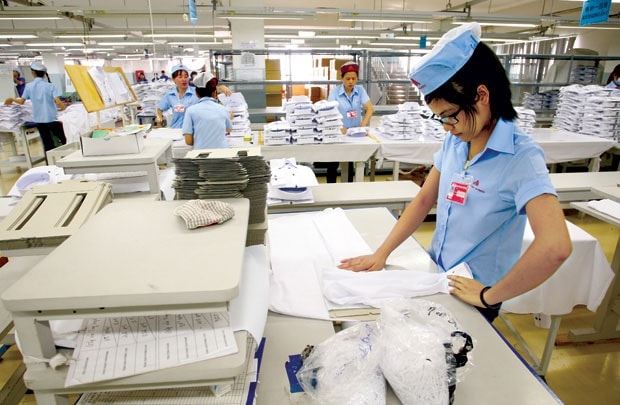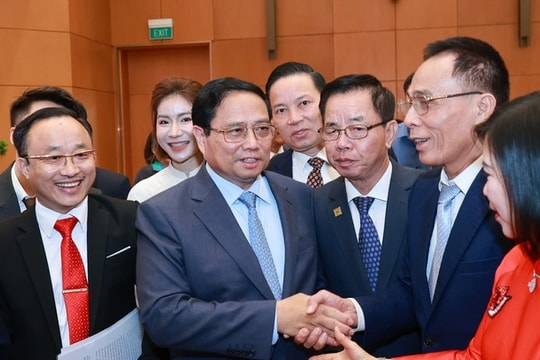Cutting down on licenses: Government requires 'words go hand in hand with actions'
The request was made by the Government in the Resolution of the regular online meeting with localities in June 2019.
|
| Abolishing and simplifying business conditions is one of the Government's key directions to improve the business environment. |
According to the Resolution recently signed by Prime Minister Nguyen Xuan Phuc, regarding the implementation of Resolution No. 02/NQ-CP on improving the business environment and enhancing national competitiveness, the Government requests ministries and agencies that have not yet completed plans to reduce and simplify business conditions to urgently complete the development and submit to competent authorities for promulgation of legal documents to implement the approved plans.
“Ministries and agencies that have made cuts must promptly and fully announce and publicize administrative procedures and seriously organize implementation as announced,” the Resolution clearly states.
For items subject to specialized inspection by many agencies, ministries and agencies must urgently review and propose a plan to unify a single focal point to carry out specialized inspection procedures, and send it to the Government Office in July 2019 for synthesis and reporting to the Prime Minister for consideration and decision.
The Government also requested ministries and agencies to complete the issuance of guidelines and plans to improve business environment indexes in July 2019; for ministries and agencies that have issued them, urgently organize dissemination and training for localities to effectively implement them.
Localities shall seriously implement the reduced and simplified business conditions that have been publicly announced; continue to review, detect, and recommend competent authorities to consider and decide on the reduction of unnecessary business conditions that hinder production and business activities.
Regarding the situation of urging and inspecting the implementation of tasks in the first 6 months of the year, the Government requires each ministry, agency and locality to resolutely carry out assigned tasks, especially projects in the work program, socio-economic development tasks in 2019 and tasks to improve the business environment stated in Resolutions No. 01/NQ-CP, 02/NQ-CP of the Government and Directive No. 09/CT-TTg of the Prime Minister.
Many units actively reduce sub-licenses
According to the Ministry of Planning and Investment, in the first 6 months of the year, in general, ministries, branches and localities have proactively and actively implemented the tasks assigned in Resolution 02, Resolution 35/NQ-CP and Directive No. 26/CTTTg on supporting and developing enterprises. As of June 26, 2019, 85% of the total tasks in Resolution 35/NQ-CP and Directive No. 26/CTTTg have been completed, 15% are being actively implemented.
Many ministries and branches have actively reviewed and proposed to reduce, simplify and transfer post-audit business conditions in the management field, achieving a rate exceeding the Government's target; at the same time, issued an administrative reform plan for 2019 to continue innovating, improving the quality and effectiveness of administrative reform work, contributing to improving the business environment and enhancing national competitiveness.
According to the summary report of the Government Office (May 2019), ministries and branches have submitted 29 legal documents to officially cut 3,425/6,191 business conditions (reaching 110.6%, exceeding 10.6% of the requirement). With this summary of the Government Office, in general, the ministries have completed the reduction and simplification of investment and business conditions in 2018.
After one and a half years since the Law on Support for Small and Medium Enterprises (SMEs) came into effect, the Decrees and Circulars guiding the implementation of the Law have basically been fully issued. At the same time, in order to promptly bring a number of policies stipulated in the Law on Support for SMEs into life, the Ministry of Planning and Investment and the Ministry of Finance are currently actively completing the draft Decree of the Government on supplementing a number of industries and sectors with investment incentives stipulated in the Law on Support for SMEs and the Resolution of the National Assembly on corporate income tax incentives for SMEs.
At the local level, as of June 20, 50/63 localities have been developing plans and projects to support SMEs with many specific policies to meet the practical requirements of developing SMEs in the province/city. In particular, some localities have approved the Project to support start-up businesses such as Hanoi, Ba Ria - Vung Tau, Thua Thien - Hue, Ha Tinh...
Implementing the Government's Resolution on promulgating the Action Program to reduce costs for enterprises, since the end of December 2018 and the beginning of 2019, many ministries, branches and localities have proactively developed and promulgated Action Plans to reduce costs for enterprises in their fields and areas of management (Ministry of Finance, Ministry of Industry and Trade, Binh Duong, Dong Thap, Tuyen Quang,...).
The Ministry of Finance has issued 17 Circulars adjusting the collection levels of fees and charges by Ministries and branches, including the plan to abolish the regulation on collecting 06 fees and 04 charges (detailed into 17 lines of fees and charges); to adjust and reduce the fees for 21 fees and 02 charges (detailed into 47 lines of fees and charges) with a reduction of about 5% - 25% compared to the current level; in particular, some fees will be adjusted with a larger reduction...
Summary table of independent review results of the Central Institute for Economic Managementon reforming business conditions:
TT | Field | Business registration before 2018 | Business registration reduction | Cut rate | Current business registration |
1 | Agriculture and Rural Development | 345 | 251 | 73% | 230 |
2 | Medical | 806 | 446 | 55% | 436 |
3 | Industry and Trade | 1098 | 515 | 47% | 634 |
4 | Build | 200 | 87 | 44% | 184 |
5 | Labor, Invalids and Social Affairs | 84 | 34 | 40% | 67 |
6 | TN&MT | 196 | 75 | 38% | 144 |
7 | Transport | 553 | 197 | 36% | 380 |
8 | Science and Technology | 92 | 24 | 26% | 68 |
9 | Culture, Sports and Tourism | 161 | 32 | 20% | 128 |
10 | Finance | 456 | 90 | 20% | 392 |
11 | Education and Training | 192 | 35 | 18% | 156 |
12 | Information and Communications | 217 | 31 | 14% | 196 |
13 | Justice | 126 | 8 | 6% | 118 |
14 | AN-QP | 123 | 5 | 4% | 118 |
Policy and implementation gaps persist
Despite the above implementation efforts, feedback from the business community shows that there is still a gap between policy and implementation, between expectations and practical requirements of businesses. Businesses continue to have feedback and recommendations related to administrative procedures, business investment conditions, contradictions and ambiguities between legal regulations, and lack of access to preferential and support policies of the State. The goal of reaching 1 million operating businesses by 2020 is facing many challenges. Ministries, branches and localities face difficulties in allocating resources to implement support policies for SMEs.
Also according to the Ministry of Planning and Investment, Resolution No. 02 requires the Ministries to "continue to review and submit to the Government to abolish and simplify unclear, non-specific and unfeasible business conditions", but so far only 02 Ministries (including Industry and Trade, Agriculture and Rural Development) have plans to implement this request. Recently, the Ministry of Industry and Trade has submitted to the Government to issue a Decree amending a number of Decrees related to investment and business conditions.
Most ministries have not yet provided guidance or training for localities or implementing units and enterprises on the content of reducing business conditions; nor have they monitored the implementation of these reforms. Through field surveys, most local departments and branches were confused when asked about business condition reforms. The results of the PCI 2018 survey by VCCI show that business conditions are still a major obstacle for enterprises.
Also in the second quarter of 2019, the specialized management and inspection of imported and exported goods has not had any significant changes or reforms. Resolution No. 02 emphasized that before June 2019, ministries and branches must complete the review and substantially reduce 50% of the number of items in the list of goods subject to specialized management and inspection. However, this task has been slow to change, mainly shifting from pre-clearance inspection to post-clearance inspection, not reducing the number of specialized inspection items as required by the Government.
Notably, according to the Ministry of Planning and Investment, the requirements for specialized management and inspection in some areas of the Ministry of Industry and Trade (such as formaldehyde testing on textile products, energy efficiency testing, additional licensing requirements for alcohol distribution, etc.) are causing difficulties, wasting time and money for businesses. These issues have been proposed many times, but have not been addressed by the Ministry.
According to the independent review results of the Central Institute for Economic Management, there is still much room for ministries and branches to continue reforming and need to make more substantial efforts to reform business conditions.



